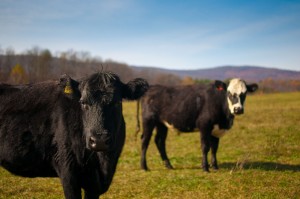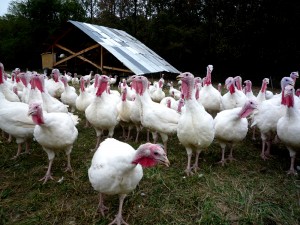
Eleven years ago I would never have dreamed of killing an animal, let alone slaughtering meat chickens that I had raised on my family’s ranch. But there I was, standing under the big oak tree outside the barn in jean cut offs, with dirt splattered up my legs, about to finish the last few chickens in an effort to truly understand where my food comes from.
I eat meat and I try my best to find grass fed and organic, or locally sourced. Humane killing practices and knowing that the meat I am eating came from an animal who lived a good life outside enjoying fresh green grass, feels better to me than swearing off meat in the name of saving lives and the environment. I rarely eat meat at a restaurant unless I know where it comes from — yes, I am that Portlandia episode.
I ate a strict vegetarian diet until I was 11-years-old when my mom decided that our family needed to eat meat for health reasons. As an adult I have often thought about those months of transition and my curiosity has led me to read dozens of books to try and understand her decision. I did research and read the “China Study,” Nourishing Traditions, Why We Get Fat, Primal Body, Primal Mind, In the Defense of Food, pro vegetarian blogs and articles, and many of the New York Times articles debating this century old question.
Michael Pollen’s “Omnivores Dilemma” introduced me to Joel Salatin, a third generation alternative farmer in Virginia who has created a model of farming opposite to the devastating factory farms that cover our nation. Salatin’s farm, Polyface, imitates nature, but on a commercial scale. His cows are treated like the herbivores they were meant to be and graze on Shenandoah Valley grass.
Polyface farm is also home to hundreds of laying hens, broilers, pigs and rabbits, and services 25 restaurants, roughly 2,000 families, and 10 retail stores in fresh organic meats. This is not a small, backyard operation.
Two years ago I went to Polyface farm and spent several days helping them process, by hand, 500 hundred broilers (the chickens used for meat). The experience prompted me to raise and slaughter broilers for my family to eat. When I was 17-years-old, I ordered just under 100 baby chicks that I raised, obsessed over and loved for three months.

In 2013 Mother Jones published an article called, “We Feed Cows Chicken Poop,” which said that although feeding live cows dead cow meat was banned in 1997, the FDA has never banned the practice of feeding an estimated 1-2 million tons of poultry litter to cattle per year. If anyone needs a reason to never eat beef again, this could certainly be it.
But Salatin argues that cattle do not have to be fed chicken feces, (or large amounts of cheaply farmed soy). Instead they can graze on several hundred acres of grass and never be confined a day in their lives.
Salatin proves that as consumers, we have the ability to eat meat not raised on factory farms. It’s a well known fact that raising meat, particularly beef, takes huge taxes on the environment.
Some say it takes 400 gallons of water to produce a pound of beef, other say 4,000. While both of those numbers seem shocking, consider this: “According to the U.S. Geological Survey, in 2005, about 201 billion gallons of water each day were used to produce electricity.”
Also, according to explorebeef.org, the Environmental Protection Agency (EPA) says that the average American uses about 100 gallons of water per day and a running toilet can waste up to 200 gallons of water per day. A cotton T-shirt takes over 713 gallons of water to produce, and the average faucet flows at a rate of 2 gallons per minute. Also, New York City’s water supply system leaks 36 million gallons per day.
The clothing I wear, brushing my teeth, my toilet — water is wasted all day, every day and not eating high quality, local meat isn’t going to fix that. Going solar might help our world far more.
I am not a heartless person who doesn’t care about the environment or the lives of animals either. I too wish that a life of no meat could ensure that less animals were being killed, but after reading Steven Davis’ “The Least Harm Principle May Require That Humans Consume a Diet Containing Large Herbivores, Not a Vegan Diet,” I began to wonder if the vegetarian diet could indeed ensure less harm.
Davis essentially argues that through farming practices to produce the vegetables for a vegetarian to eat, hundreds of small animals are being killed. Are there arguments against this study? Of course. Some say his numbers aren’t accurate, others say mice and rabbits are different than chickens and cows. To me, it ultimately made sense.
I would rather support small farms, and eat meat that gives my body nutrients and fuel, than swear off animal products in the name of saving lives and supposedly the environment.



